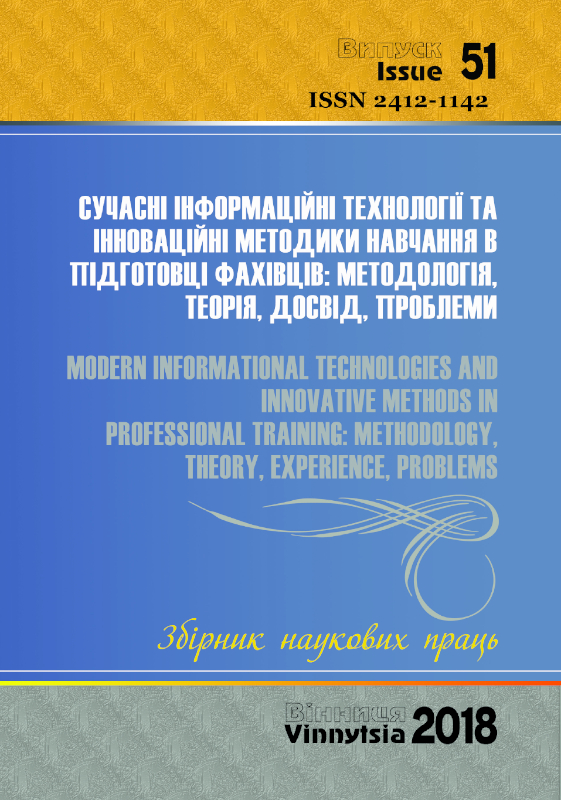IMPLEMENTATION OF INNOVATIVE TECHNOLOGIES IN EDUCATION: THE CHALLENGE OF THE XXI CENTURY, PROBLEMS AND PERSPECTIVES
Keywords:
Innovation, innovative methods, technologies, multimedia devices, internet, computer, distance education, self-studyingAbstract
The given article is dedicated to the necessity of applying diverse innovative technologies in the area
of education. The key pillar is focused on the best attributes of different innovative methods. There have been
considered the definitions of innovation and technology, in particular. The most significant attention is drawn to the
distance education via multimedia devices and self studying of learners. There have been taken into account several
acts as for the distance education.
There have been researched the combination of telecommunication informational technologies with
pedagogical informational technologies. Currently, our society is on the way of a certain challenge in educational
sphere, due to the existence of varieties in acknowledging the material. Naturally, implementation of innovative
technologies during this trend faces a great deal of obstacles that might seem to be rarely or never overcome.
However, the objective of the article is to cope with emerged concerns and define the beneficial sides of the best
variants that definitely appear while using different multimedia sources.
Apart from computer technology and internet, as representatives of innovative technologies, an urgent
attention is devoted to self-studying of students. Undoubtedly, permanent evolving of this approach will be beneficial
not only for successful professional sphere of every person , but also it will assist in new opportunities for restructuring
of higher education, overall.
Downloads
References
Гокунь О.О. Основи інформаційних технологій навчання. / О.О. Гокунь, М.І. Жалдак, Ю.І.Машбиць та ін. – Кривий Ріг: Видавничий відділ КДПУ. – 2001. – 210 с.
Биков В.Ю. Інноваційний розвиток засобів і технологій систем відкритої освіти / В.Ю.Биков // Сучасні інформаційні технології та інноваційні методики у підготовці фахівців: методологія, теорія,досвід, проблеми. Зб. наук. праць. – Випуск 29. – Київ-Вінниця: ТОВ фірма «Планер», 2012. – С.32-40
Стефаненко П. Теоретичні і методичні основи дистанційного навчання у вищій школі. Диссертація, докт. пед. наук: 13.00.04 / Ін-т пед. і псих. АПН України. – К., 2002. – 490 с. Муліна Н. Методика розробки та використання дистанційного курсу англійської мови (старший ступінь у вищому технічному закладі освіти).
Н. Муліна- Автореф. – диссертація, к. пед. н.: 13.00.02 Київський національний лінгвістичний університет]. – К., 2001. – 22 с.
Олійник В.В. Дистанційне навчання в післядипломній педагогічній освіті: Організаційно-педагогічий аспект / В. В. Олійник Навч.посібник. – К.: ЦІППО, 2001. – 148 с.
Кухаренко В.М. Дистанційне навчання: умови застосування. /За редакцією В.М. Кухаренка. Харків: НТУ „ХПІ” „Торсінг”, 2001. – 319 с.
https://uk.wikipedia.org/wiki/
«Про національну програму інформатизації», Закон України від 04.02.1998 р. No 74/98-ВР. [Електронний ресурс] Режим доступу:http://www/osvita.org.ua/distance/pravo/08.html
Постанова «Про затвердження Програми розвитку системи дистанційного навчання на 2004-2006 роки .»
[Електронний ресурс] Кабінет Міністрів України; Постанова від 23.09.2003. No1494 Режим доступу: http://
zakon.rada/gove/ua/cgi-bin/laws/main cgi?nreg=1404-2003-%EF
Downloads
Published
Issue
Section
License
Copyright (c) 2018 В. О. Сенченко, О. В. Шестопал, Н. А. Насонова

This work is licensed under a Creative Commons Attribution 4.0 International License.

